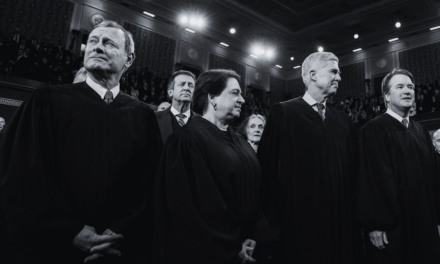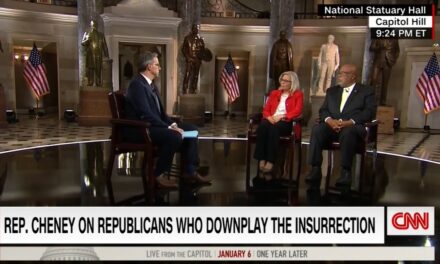We support our Publishers and Content Creators. You can view this story on their website by CLICKING HERE.
For many decades, the notion of a child-centered politics has traditionally been relegated to the social conservative wing of the Republican Party. And for much of that time, social conservatives were always the shorter leg of the wobbly three-legged stool of Republican fusionism that awkwardly grouped them together with defense hawks and free market libertarians. For the most part, social conservatives would march in the cold, futilely clamoring for the end of abortion and a return to Christian morality while Republican politicians would pay lip service to their causes and proceed to ignore them during their time in office.
Along with so much else in politics, Trump and the MAGA movement reversed this dynamic, giving priority to the social conservatives after half a century of neglect. The old fusionism had become remarkably dated, leading to pointless wars abroad and a corporatist economy at home. New principles were needed that would reinvigorate the working and middle classes, and along with it a recognition that the abandonment of traditional morality has been a disaster for America, especially the working class. Subsequently, it has become clear that one core principle of MAGA conservatism is the welfare and success of children. Organizing policy around children and families has proven to be the lynchpin bringing together a diverse coalition to agree on a wide array of issues.
As if to meet the moment, writer and pro-child activist Katy Faust has recently edited and put together a series of essays in the new book Pro-Child Politics: Why Every Cultural, Economic, and National Issue is a Matter of Justice for Children. Each essay covers a different issue, and together the book articulates a comprehensive policy program that puts children first in a world that has neglected them.
In many ways, Faust’s book is the perfect answer to the skeptics who disdain populist talking points as the uninformed passions of the mob. All the main issues are covered by an impressive team of writers and scholars (including Faust herself) who offer clear, concise diagnoses and prescriptions for the biggest problems ailing American children. As such, it’s both a great introduction to readers unfamiliar with education policy as well as a substantive encapsulation for readers with more of a background in these matters.
The way Faust is able to make this work is by implementing a clear template for the writers to follow. Each essay begins with a story illustrating the problem at hand, which is then followed by the list of lies peddled by the corporate media and an explanation of how these lies hurt children. In the second half of the essay, these lies are debunked, followed by an explanation of how acknowledging reality would help children, and finally, how a pro-child politics could incorporate these truths in the effort to help children.
While this format could be restrictive, it helps enormously in simplifying complex issues and making them readable. It felt somewhat like dialectics of Thomas Aquinas’s Summa Theologica where two sides are presented and the Angelic Doctor settles the matter at the end by evaluating each point and determining the best resolution. The difference is that Faust’s book is less dry and much more accessible.
While all the chapters are excellent, the most notable (for me, at least) were “ESG and DEI” by Justin Danhof, “The Environment” by Chris Barnard, and “Border Security and Immigration” by Lora Ries. The writers of these essays do a masterful job of taking issues that seem the least connected to children and making them relevant for families. Altogether, it becomes apparent that modernity suffers from deep misunderstandings of human nature that have resulted in a lopsided economic system and government that hurts the great majority of Americans.
Of course, the essays on issues directly pertaining to children also do a fine job highlighting how leftist ideology has infiltrated the culture and corrupted institutions. Condensing much of what she discusses in her previous book, Them Before Us, Faust’s essay “Family” explores the abuses of Big Fertility and the commodification of children, which has become even more urgent today as both parties have embraced IVF and surrogacy.
Similarly, Abby Johnson’s harrowing descriptions of abortion will shock complacent Americans who think that protecting the unborn has ended with the passage of Dobbs. There are also chapters on the dangers of toxic feminism by Peachy Keenan, gender ideology by Canadian activist Billboard Chris, and pornography by John Schweppe, all of which are devastating younger generations.
If one criticism could be made by the book, it would be the short shrift given to issues concerning education. I say this as a high school English teacher who has written extensively on the K-12 schools, and I fully admit my partiality on discussing this topic at length. However, in a book devoted to laying out a pro-child politics, the essay where Tiffany Justice makes a case for parental rights in education just isn’t enough. The whole American educational system needs to be overhauled, and this problem affects children more than anything else.
At least two more essays, if not a whole book, could have been included on this front, one on the need for school choice in K-12 education (I’m available anytime if Cory DeAngelis is busy) and the need for fixing the rot in colleges (Mark Bauerlein or Chris Rufo could write about this in their sleep). These are huge issues at the state and local levels, and Democrats continue to dominate the discussion despite their increasingly obvious ignorance and incompetence.
But once again, I’m biased, and Faust has already done the laudable work of putting together so many important arguments and making them presentable. In the years to come, Pro-Child Politics should serve as required reading for anyone who wants to find a place to contribute their talents to helping children. The book is a testament to how far social conservatism has come, and how much more work needs to be done to truly Make America Great Again.

 Conservative
Conservative  Search
Search Trending
Trending Current News
Current News 





